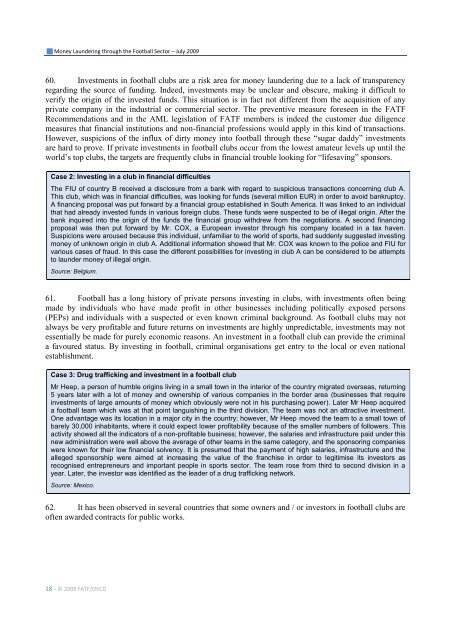Money Laundering through the Football Sector
Money Laundering through the Football Sector
Money Laundering through the Football Sector
You also want an ePaper? Increase the reach of your titles
YUMPU automatically turns print PDFs into web optimized ePapers that Google loves.
<strong>Money</strong> <strong>Laundering</strong> <strong>through</strong> <strong>the</strong> <strong>Football</strong> <strong>Sector</strong> – July 2009<br />
60. Investments in football clubs are a risk area for money laundering due to a lack of transparency<br />
regarding <strong>the</strong> source of funding. Indeed, investments may be unclear and obscure, making it difficult to<br />
verify <strong>the</strong> origin of <strong>the</strong> invested funds. This situation is in fact not different from <strong>the</strong> acquisition of any<br />
private company in <strong>the</strong> industrial or commercial sector. The preventive measure foreseen in <strong>the</strong> FATF<br />
Recommendations and in <strong>the</strong> AML legislation of FATF members is indeed <strong>the</strong> customer due diligence<br />
measures that financial institutions and non-financial professions would apply in this kind of transactions.<br />
However, suspicions of <strong>the</strong> influx of dirty money into football <strong>through</strong> <strong>the</strong>se “sugar daddy” investments<br />
are hard to prove. If private investments in football clubs occur from <strong>the</strong> lowest amateur levels up until <strong>the</strong><br />
world‟s top clubs, <strong>the</strong> targets are frequently clubs in financial trouble looking for “lifesaving” sponsors.<br />
Case 2: Investing in a club in financial difficulties<br />
The FIU of country B received a disclosure from a bank with regard to suspicious transactions concerning club A.<br />
This club, which was in financial difficulties, was looking for funds (several million EUR) in order to avoid bankruptcy.<br />
A financing proposal was put forward by a financial group established in South America. It was linked to an individual<br />
that had already invested funds in various foreign clubs. These funds were suspected to be of illegal origin. After <strong>the</strong><br />
bank inquired into <strong>the</strong> origin of <strong>the</strong> funds <strong>the</strong> financial group withdrew from <strong>the</strong> negotiations. A second financing<br />
proposal was <strong>the</strong>n put forward by Mr. COX, a European investor <strong>through</strong> his company located in a tax haven.<br />
Suspicions were aroused because this individual, unfamiliar to <strong>the</strong> world of sports, had suddenly suggested investing<br />
money of unknown origin in club A. Additional information showed that Mr. COX was known to <strong>the</strong> police and FIU for<br />
various cases of fraud. In this case <strong>the</strong> different possibilities for investing in club A can be considered to be attempts<br />
to launder money of illegal origin.<br />
Source: Belgium.<br />
61. <strong>Football</strong> has a long history of private persons investing in clubs, with investments often being<br />
made by individuals who have made profit in o<strong>the</strong>r businesses including politically exposed persons<br />
(PEPs) and individuals with a suspected or even known criminal background. As football clubs may not<br />
always be very profitable and future returns on investments are highly unpredictable, investments may not<br />
essentially be made for purely economic reasons. An investment in a football club can provide <strong>the</strong> criminal<br />
a favoured status. By investing in football, criminal organisations get entry to <strong>the</strong> local or even national<br />
establishment.<br />
Case 3: Drug trafficking and investment in a football club<br />
Mr Heep, a person of humble origins living in a small town in <strong>the</strong> interior of <strong>the</strong> country migrated overseas, returning<br />
5 years later with a lot of money and ownership of various companies in <strong>the</strong> border area (businesses that require<br />
investments of large amounts of money which obviously were not in his purchasing power). Later Mr Heep acquired<br />
a football team which was at that point languishing in <strong>the</strong> third division. The team was not an attractive investment.<br />
One advantage was its location in a major city in <strong>the</strong> country; however, Mr Heep moved <strong>the</strong> team to a small town of<br />
barely 30,000 inhabitants, where it could expect lower profitability because of <strong>the</strong> smaller numbers of followers. This<br />
activity showed all <strong>the</strong> indicators of a non-profitable business; however, <strong>the</strong> salaries and infrastructure paid under this<br />
new administration were well above <strong>the</strong> average of o<strong>the</strong>r teams in <strong>the</strong> same category, and <strong>the</strong> sponsoring companies<br />
were known for <strong>the</strong>ir low financial solvency. It is presumed that <strong>the</strong> payment of high salaries, infrastructure and <strong>the</strong><br />
alleged sponsorship were aimed at increasing <strong>the</strong> value of <strong>the</strong> franchise in order to legitimise its investors as<br />
recognised entrepreneurs and important people in sports sector. The team rose from third to second division in a<br />
year. Later, <strong>the</strong> investor was identified as <strong>the</strong> leader of a drug trafficking network.<br />
Source: Mexico.<br />
62. It has been observed in several countries that some owners and / or investors in football clubs are<br />
often awarded contracts for public works.<br />
18 - © 2009 FATF/OECD


